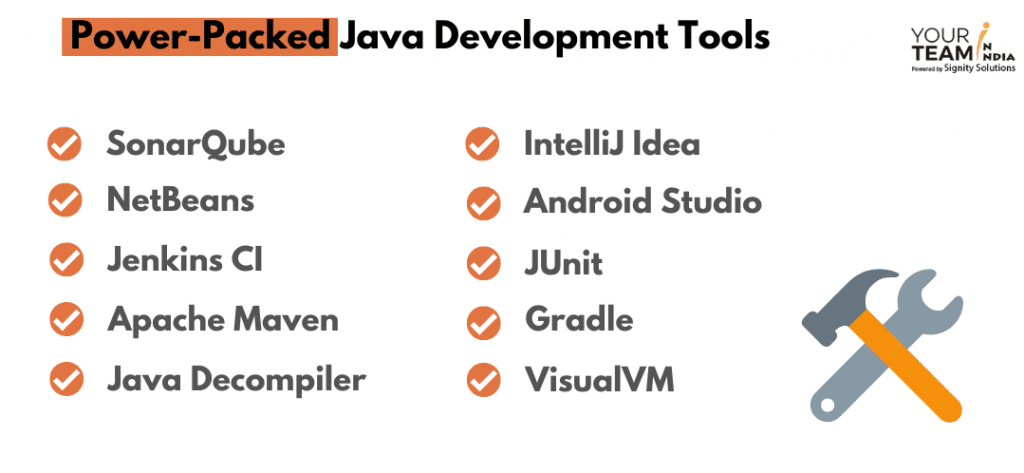Quick Summary:
Spending time on Java applications is indispensable if you are a web developer or planning to make software. And you know what they say? “You are as good as your tools are!” This article aims to give a peek into the best Java tools that ensure seamless development.
Java development tools have contributed to the longevity of Java's relevance in the industry. Only a handful of technologies hold the caliber to hang around for over 20 years and be relevant in the industry. With the onslaught of other programming languages in the application development industry, Java continues to be one of the most loved languages. Released in 1995, it stands as the fifth most widely used language worldwide, and that too for all good reasons. Its dynamic performance and flexibility make it a perfect choice for IoT, enterprise, and Android apps.
Further, a survey revealed almost 65% of respondents use Java. It is the most uncomplicated language to learn and gives you the power to frame apps however you want to stay ahead of the curve.
- You can manage the behavior of web pages using Java.
- It allows you to create dynamic web elements like interactive maps, clickable buttons, animated graphics, etc.
- It provides a great user experience in terms of readability and navigation.
Do you have an app idea that you wish to turn into reality? Then, remember not to exclude this commercial-grade programming language! Utilizing Java development tools is one of the ways to ensure you have adequate and practical Java code. Don’t know what they are? Or which should you use? Worry not! This blog will walk you through a curated list of solutions that address your problems. So keep reading to learn about the top-tier Java development tools for developers!
Key Takeaways
- Java continues to stay in the market despite the other programming languages. It outshines the others in speed, simplicity, scalability, and deployment.
- Many free and open-source tools aid in Java project’s build, profiling coverage, and review.
- Each Java tool tackles a different concern, and all share a common thing: delivering excellent coding and development assistance.
- Java programming language enables developers to design scalable, flexible, and secure applications on any device.
Top 10 Java Development Tools You Should Be Using In 2023

Regardless of how small or large your application is, it must go through a specific series of processes. You can do it manually, of course. However, testing and configuring the apps is arduous and takes significant time. The average time to create an app from scratch is about 7-12 months.
Luckily, numerous tools ensure the tiring tasks don’t weigh the development process down. Java programs can run on multiple platforms; of course, there is no shortage of tools. Here is a list of notable Java development tools for developers.
1. SonarQube
SonarQube is a Quality Assurance tool that gathers and verifies code. It allows you to measure quality continuously and merges dynamic and static analysis. The open-source platform offers code quality metrics, continuous inspection, and issue-tracking capabilities.
It presents a static analysis and promises code readability and application security. It ensures your code base is clean and rational, thus, minimizing technical debt. It analyzes code from multiple aspects and unveils the problematic area that warrants improvement.
Features
- It offers quality and management solutions to rectify and address the issues.
- It can automatically speculate multiple code issues, like duplicated code, overused methods, and unused variables.
- It supports several programming languages and can analyze code using various testing tools and frameworks.
- You can receive feedback during the code review with branch analysis and a moment-in-time snapshot of the code quality.
- SonarQube assists programmers in penning coding rules, de-duplications, test coverage, code complexity, and API documentation within a single dashboard.
Related Read: Java Vs. Python: Which One To Choose For Your Business Application?
2. NetBeans
NetBeans is an open-source IDE (Integrated Development Environment). It sets the standard for end-to-end app development with improved speed and Java application performance. The project management tool runs on a modular architecture and leverages many Java development tools.
It harbors a development cycle from the inception of a plan to deployment. NetBeans supplies code editors, templates, and wizards to help Java developers build web, mobile, and desktop applications. It also caters to front-end designers by writing cleaner and safer code per the drag-and-drop feature.
Features
- NetBeans backs the latest Java projects and technologies. It enhances project management with fast and efficient code editing.
- It accompanies open-source integrated tools and supports step-by-step dialogues for the wizard framework.
- The platform stores data and hints at code optimization while identifying bug patterns.
- The easy-to-install IDE offers various Java frameworks and integrates with other third-party libraries.
- It supports multiple languages and allows you to employ Java testing tools and test code for automation testing.
- Upgrade your project's success – Hire expert Java developers today and experience unparalleled performance for your applications!
Upgrade your project's success – Hire expert Java developerstoday and experience unparalleled performance for your applications!
3. Jenkins CI
Jenkins CI is yet another open-source testing framework written in Java programming. It is an automation server-based system that assists in finding and resolving faults in code and automating it. It collaborates with all primary tools and inhabits a rich API to simplify the implementation and boost integration.
You can use Jenkins to deploy color-coded source code into production and automate the rest of the building process. Further, you can integrate it with other platforms like Slack to observe the viability of the process. It promotes transparent development frameworks and ensures no broken code enters the production.
Features
- Jenkins is a self-contained program. It can run with Mac OS, Windows, or Unix-based operating systems.
- It presents hundreds of plugins in the Update Center that can integrate with all sorts of tools in the CD and CI toolchain.
- It accelerates development by distributing building, testing, and deployment across multiple machines.
- You can assimilate Jenkins with various cloud platforms like Digital Ocean, Amazon EC2, and Google Cloud.
- Its web interface facilitates seamless configuration and features error checks and a built-in help function.
Also Read: 20 Reasons to Choose Java for Backend Development
4. Apache Maven
Maven is a trendy open-source build tool to develop, publish, and deploy multiple projects simultaneously for optimal project management. Several software developers employ the platform to engineer robust and reliable Java applications. It aims to refine the app creation by furnishing reports, checking builds, running tests for automation setups, and dependency management.
Maven is the cornerstone of Java development tools and assists in managing a project’s build, reporting, and documenting. It is a Project Object Model (POM). Its XML-based configuration model simplifies the outline and allows you to execute the project. It takes over complicated concepts and cuts them down into digestible pieces.
Features
- It presents plugins that can add functionality to the built environment, like static code analysis, code coverage analysis, and more.
- You can customize or tailor the solution to meet your needs and requirements.
- It supports test-driven development, declarative configuration, long-term project maintenance, and plugins.
- Maven provides flexibility with standardized, conventional practices and superior dependency management.
- It follows a simple structure and retains all the information in a single place.
5. Java Decompiler
Want to turn the compiled files back to the source code? Java Decompiler works the opposite of the compiler function. It is the reverse process to decompile class files. However, it does not return the replica of the code. You lose some of the information during the program compilation.
In addition, the transformation is not one-to-one. It offers a command-line interface and converts ‘.class’ files into Java files. The unmaintained decompiler beautifies the Java code lines to increase readability.
Features
- It provides plugin support within the Java programming language.
- Java Decompiler supports drag and drop for easy software creation.
- It puts forward a supportive and productive environment.
- You can get support for declarative statements using the cross-cutting abstraction.
- Java Decompiler can meticulously integrate with Eclipse and other Java libraries.
6. IntelliJ Idea
Developers often employ various reusable code pieces to materialize their app idea. You may find it exciting and easy, but such executions typically mess up the project. Your proficiency, work schedule, and understanding of the project cast a shadow on the process.
Relying solely on existing code can compromise product quality and delay timelines. That is where IntelliJ Idea enters the game! You can save time on Java projects and increases productivity. It mitigates monotonous and risky tasks and maintains uniformity in the apps.
Features
- Find duplicate code fragments in a snap and merge your app with Upsiurce, Zendesk, Slack, Mailbox, and other platforms.
- It lists the most relevant and applicable symbols in the current context with an editor-centric environment.
- It furnishes reliable inspections and quick fixes.
- It delivers fewer exceptions and bug patterns, optimal code referencing and structure, and a simple project setup.
- You can implement clever code completion, static code analysis, and refactoring to prioritize core tasks.
7. Android Studio
While you use NetBeans to create engaging web and desktop apps, you can depend on Android Studio for premier Android applications. The free Java development tool provides quicker coding and workflow iteration. It comes with Lint tools, Android-specific refactoring tools, etc.
Java platform does not contain all the code, and users may be unable to run specific codes on their devices. Android Studio understands that; hence, it furnishes support and integrations from other programming languages like C++ and NDK.
Features
- You can leverage Maven, Apache Tomcat, Google Messaging, App Engine, and more.
- Android Studio accompanies an Emulator that aids in starting the app faster than the actual device.
- You can simulate various hardware features, such as motion and acceleration sensors, GPS, multiple touch inputs, etc., across different devices.
- Code editor and code push optimize coding output and facilitate instant workflow evaluation.
- It provides many Java frameworks and tools to test Android apps.
8. JUnit
JUnit is an open-source testing framework or tool for Java language. It facilitates unit testing. It is an essential tool and forms unit testing frameworks collectively called xUnit. You can use JUnit to write and test code.
You can write and execute redundant, automated tests. JUnit follows a ‘first testing, then coding’ approach, emphasizing first setting up the code to test and later implement. It reduces app debugging time by enhancing productivity and stabilizing the program code.
Features
- You can get test runners and assertions for running tests and expected results.
- It provides annotations to identify test methods and paves the way to write Java code instantaneously.
- You don’t need to comb through the piles of test results. Automated JUnit tests, checks, and provides feedback on their own.
- A bar indicates the test progress and outcomes. It turns green when the test runs smoothly and red if it fails.
- You can organize JUnit tests into suites.
9. Gradle
Do you wish to design an Android application? Gradle is here to help you and make it easier! It ensures you generate an APK from files in the most efficient manner. Gradle is a build automation tool that can automate application development. It is known for building large projects and software.
If you liked ANT and Maven, then you will surely love Gradle. It possesses the perks of both and curbs their cons. This concise and comprehension tool helps you build, test, and deploy software on several platforms. It typically implies smaller configuration files and less clutter.
Features
- It can adapt to any structure. This way, you can create your Gradle build in the same branch where you create a live script.
- Gradle allows fine-grained parallel execution of tasks and intra-task work via a rest API.
- It focuses on usability, maintenance, flexibility, performance, and scalability.
- It is twice as fast as Maven. Further, it resolves the issues that you may encounter with the latter.
- You can expect a better user experience, a command-line interface, and other features.
10. VisualVM
VisualVM is one of the sought-after Java development tools thanks to its exceptional offerings. It provides a visual interface that allows you to access profound and detailed information about remote and local Java applications. It utilizes and combines some command-line tools and bundles them up to peek into the applications within Java Virtual Machine (JVM).
VisualVM helps track memory leaks, analyze data, and monitor the garbage collector and profiler CPU. You don’t need to do anything to get the tool. It is available in the Java Development Kit (JDK) bin directory.
Features
- You can monitor memory usage, runtime behavior, and application threads.
- It furnishes heap dumps that are handy in analyzing heap memory allocation.
- The all-in-one monitoring and troubleshooting tool offers seamless integration with NetBeans, VS Code, and Eclipse.
- VisualVM features thread dumps for a glimpse of the target process. It figures out the objects or resources causing deadlocks or race conditions.
- It can read information about the crashed Java process and its environment.
Conclusion
You must get the hang of Java development tools if you are a Java developer. In addition to the mentioned solutions, Java applets, Cobertura, Groovy, Eclipse, Web Socket annotations, Git, Java servlet, and Selenium are among the itinerant tools. Do you know what is better? Numerous Java development tools guarantee a pleasant development experience with integrated version control systems. And that’s all for free!
You can learn the listed elements to streamline both development and production. Adequate Java programming tools will aid you in leveling up and distinguish you from the average developer. You may view Java as a piece of cake, but it might be challenging for someone else. However, the reality remains! You will undoubtedly need Java development tools for developers if you wish to develop and create apps.
Frequently Asked Questions (FAQs)
What are developers' tools in Java?
When is the right time to use Java programming tools?
How many components form JUnit?
JUnit Platform: It is the platform to launch testing frameworks on JVM.
JUnit Vintage: A TestEngine to execute JUnit 3 and 4 tests.
JUnit Jupiter: It gives a programming model for writing tests.






